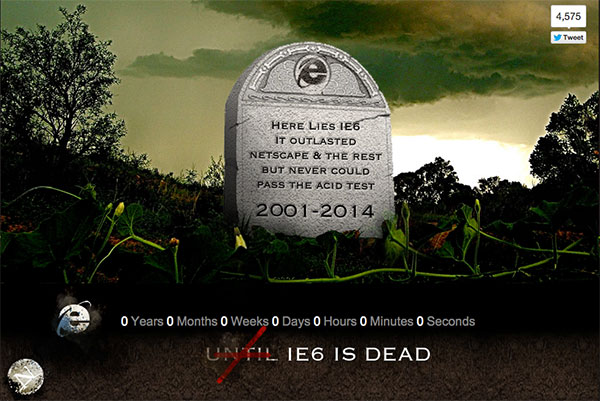The History of Internet Explorer Hatred
Microsoft's Internet Explorer was one of the earliest things that made tech users really freaking mad. It gave those users something to fight against.
$2M
85
David vs. Goliath: Internet Explorer Sucks edition
The browser wars were often fought in boardrooms, at conferences, in tech blogs written by columnists with unforgettable names like John C. Dvorak. Microsoft, smartly, figured out that the internet would become a massive phenomenon, and just as it was blowing up, it took advantage of that fact by leveraging its existing market power to define our online experience.
But for all the money Microsoft could throw at the issue and all the marketshare they attained, they couldn’t stop the haters. Some of the internet’s earliest haters put a lot of their energy against IE, effectively costing the company its most tech-savvy fans at a key point in its growth.
Geocities’ greatest griper
Perhaps the best-known of these sites was the Geocities page “Microsoft Internet Explorer Sucks,” a page that went up sometime around 1997. The anonymous author offered up the nerdy everyman’s take on the exact reasons IE isn’t worth your time.
“First of all it sucks (that’ll be explained later), so Microsoft knows nobody would chose IE over a much superior product, Navigator,” the author argues convincingly. “Then, Microsoft wants to dominate the browser market so that it can kill innovation and all forms of cross-platform software (such as ones already being programmed with Java) that will arise from this innovation so that MS can keep its Windows monopoly—so vital to the company’s success.”
Internet Explorer hate as art project
Another site from the era, “Internet Exploiter,” takes a human-rights angle to to the problem, pointing out a fact that hasn’t changed much since it was first made: few Chinese users know any desktop browser besides Internet Explorer.
“China (just like hell) is another market we can totally monopolize,” a parodied Bill Gates explains on an Internet Exploiter China parody site. “With a good digital nervous system and our version of Internet Exploiter, China... I mean Microsoff... should be able to take over the world in no time.”
IE users not allowed
Still, others simply took matters into their own hands. UNIX pro Devin Carraway offered the technically inclined numerous solutions for blocking IE users from viewing websites—including his own.
“The ethics of the situation, and the decision, are rather complicated,” Carraway explained. “My own justification is that I’m angered by the degree to which Microsoft has abused, exploited and tried to control the Internet, and if people are going to come to my proverbial electronic front door with that browser, I’m going to make them click through me griping about it first.”
Carraway first put up his site in 1999. It’s been active ever since.
“To the extent that browsing-specific routines have been commingled with operating system routines to a greater degree than is necessary to provide any consumer benefit, Microsoft has unjustifiably jeopardized the stability and security of the operating system. Specifically, it has increased the likelihood that a browser crash will cause the entire system to crash and made it easier for malicious viruses that penetrate the system via Internet Explorer to infect non-browsing parts of the system.”
— U.S. District Judge Thomas Penfield Jackson, in his findings of fact in the Microsoft antitrust trial, which revealed what most technically inclined consumers had figured out by then: that Microsoft had been so aggressive in pushing Internet Explorer on its audience that it made Windows 98 fundamentally insecure and susceptible to viruses. The situation was serious enough that the U.S. Justice Department once considered splitting Microsoft in two. That never happened, though the company did face restrictions on its business activities that lasted into 2011.

Anti-IE6 campaigns taught the internet to fight SOPA. No, really.
Despite all these early gripes, the real point where Microsoft lost the PR plot with Internet Explorer was during the long delay between Internet Explorer 6 and Internet Explorer 7—a five-year period in which the internet evolved, but Microsoft basically stopped evolving, choosing instead to only release new browsers when it released new versions of Windows.
“Internet Explorer was a prime example of Microsoft’s extremely anti-competitive behavior, and when they had enough of a market share, they stopped innovating and just became a feature-poor pain in the ass,” Lifehacker’s Whitson Gordon wrote in 2012.
Fortunately, the period of Internet Explorer’s decline came about as Mozilla Firefox’s standards-oriented approach began to win over a number of users. Eventually, the Webkit-based Apple Safari emerged, further underlining the value of standards-based web design. Then Google got involved with Chrome—and Microsoft couldn’t be lazy anymore.
Eventually, a new era of IE hatred exposed itself. The issue was that the long delay between versions of IE ensured that millions of users, corporations, and entire countries were stuck with outdated technology, with no real reason to upgrade.
Meanwhile, web developers, finally having concrete evidence that standards-based web browsers were better, had all the evidence they needed to push IE6 off the face of the internet—and started launching advocacy campaigns against an outdated browser that had grown long in the tooth. Say what you will about these campaigns, but they largely worked—with few holdouts to this day.
In fact, they worked so well that Microsoft itself launched a countdown site of its own for IE6. Similar campaigns are already underway for IE8, too.
These campaigns, it could be argued, taught the online world about the importance of banding together to fight a populist cause—protecting the internet’s growth. If you look at sites like IE6 Death and compare them to strategies like SOPA Strike, which took on the Stop Online Piracy Act, it’ll feel like the same people are fighting for different causes.
And technically, they were. The internet banded together in one massive campaign to kill IE6, one of the biggest cockroaches on the internet. In comparison, SOPA was easy.
”No matter what Microsoft did with Internet Explorer, it would always feel like the bully trying to make amends for punching you in the face,” Mashable editor-at-large Lance Ulanoff wrote earlier this week.
And that’s the reason why IE has to die. Microsoft got into the web browser business not to improve the web, but to protect its market share, and while the company may have changed its tune since, the name is a reminder that its motive for building a web browser in the first place wasn’t pure.
“Some day I hope to get a proper answer on our motivation to do WinIE and MacIE in the first place,” a member of the Mac Internet Explorer team wrote on Slashdot in 2005. “It seems to be that we were scared of not having control of the HTML standard.”
Internet Explorer sucks, but at this point, it’s the name that sucks, not the idea of Microsoft doing a web browser.
:format(jpeg)/2018/04/zorxcfmi2zy5as9r7e92--1-.gif)
/2018/04/zorxcfmi2zy5as9r7e92--1-.gif)


/uploads/ernie_crop.jpg)